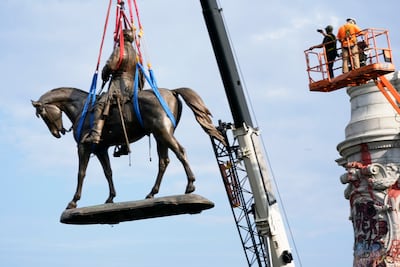Today, on the second Monday of October, the US government celebrates Columbus Day as a federal holiday.
Government offices, banks and schools are shut down across the country for a long weekend.
But an increasing number of state and local governments are moving away from the holiday, choosing instead to recognise Indigenous Peoples' Day.
Rather than honouring European explorer Christopher Columbus, who landed in the present-day Bahamas in 1492, the day remembers and celebrates the history and culture of the Native American peoples.
President Franklin D Roosevelt first proclaimed a national Columbus Day in 1934, asking Americans to observe it with sentiment "befitting the anniversary of the discovery of America".
Italian-American communities used the holiday to highlight their heritage and accomplishments in honour of the Italian explorer.
But to generations of indigenous people, Columbus represents the start of the colonisation of the Americas and the dispossession and the death of millions.
By 1900, it was estimated that 80 per cent of the US indigenous population was wiped out.
A group of indigenous activists first proposed an Indigenous Peoples' Day in 1977 at the first UN Conference on Indians in the Americas, which was held in Geneva.
By a vote of 143 in favour, four against and 11 abstentions, the UN General Aassembly adopted the UN Declaration on the Rights of Indigenous Peoples on September 13, 2007.
The US, Canada, Australia and New Zealand voted against the measure, quoting provisions on self-determination, land and resources rights and the state management of resources.
This land is your land
South Dakota, where about 8 per cent of its population identifies as Native American, became the first state to officially celebrate Native Americans' Day instead of Columbus Day in 1990.
Berkeley, California, the birthplace to the campus free speech movement in the 1960s, was the first city to adopt Indigenous Peoples' Day in 1992 as a counter-protest to a 500th anniversary celebration of Columbus’s arrival.

Some local municipalities and state governments throughout the US have chosen to remove statues glorifying the so-called discoverer as well as those erected in homage to the Civil War.
In 2020, the Columbus statue was removed from California's state capitol in Sacramento, where the second Monday in October is now called Italian-American Heritage Day.
Overseers of Tower Grove Park in St Louis, Missouri, voted for the removal of a 134-year-old Columbus statue, with many other cities including Chicago and Detroit following suit.
To date, 33 monuments to Columbus have been removed and 60 homages to the Confederates of the Civil War are now history, the Southern Poverty Law Centre says. Last summer, the US House of Representatives voted for the removal of certain busts and statues on display at the US Capitol.

